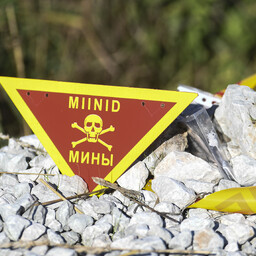Eesti, Läti, Leedu ja Poola
kaitseministrid
ütlesid, et nad soovivad lahkuda Ottawa konventsioonist. See konventsioon keelab jalaväemiinide kasutamise. Nad leidsid, et
praeguses julgeoleku olukorras
on vaja meie kaitsejõududele väga palju paindlikkust. Selle paindlikkusega saab tugevdada
NATO idapiiri kaitse
. Nende sõnum on selge: meie riigid on valmis kasutama kõiki meetmeid oma
territooriumi ja rahva kaitsmiseks
.
kaitseministrid
Tõlge fraasile: kaitseministrid
EN
defense ministers
praeguses julgeoleku olukorras
Tõlge fraasile: praeguses julgeoleku olukorras
EN
in the current security situation
NATO idapiiri kaitse
Tõlge fraasile: NATO idapiiri kaitse
EN
defense of NATO's eastern border
territooriumi ja rahva kaitsmiseks
Tõlge fraasile: territooriumi ja rahva kaitsmiseks
EN
to protect the territory and people
Kaitseministrid ütlesid, et pärast Ottawa konventsiooniga liitumist on julgeolek halvenenud. Venemaa ja Valgevene ohu tõttu on meie piiril suurem
sõjaline oht
. Praegu on Venemaa oht Euroopa ja NATO-le väga suur. Sellises olukorras on tähtis võtta kõiki samme, et
tugevdada meie kaitset
ja hoida Vene agressioonist ära.
sõjaline oht
Tõlge fraasile: sõjaline oht
EN
military threat
tugevdada meie kaitset
Tõlge fraasile: tugevdada meie kaitset
EN
strengthen our defense
Välisminister Margus Tsahkna ütles, et Venemaa pole liitunud Ottawa konventsiooniga. Seetõttu ei saa me keelata endil jalaväemiinide kasutamist, kui Venemaa on valmis neid kasutama. Kaitseministrid ütlesid, et Ottawa konventsioonist lahkumise korral jääb meie riik truuks
rahvusvahelisele humanitaarõigusele
. See tähendab, et me kaitseme tsiviilelanikke sõja ajal.
rahvusvahelisele humanitaarõigusele
Tõlge fraasile: rahvusvahelisele humanitaarõigusele
EN
international humanitarian law
Ka teised riigid arutavad Ottawa konventsioonist lahkumist. Soomes koguti detsembris üle 50 000 allkirja konventsioonist lahkumiseks. Sama teema läheb nüüd Soome parlamendis arutamisele. Ottawa konventsioon ehk lepe jalaväemiinide kasutamise keelustamiseks tehti 3. detsembril 1997. See kehtis alates 1. märtsist 1999. Eesti liitus selle leppega 1. oktoobril 2004.
Ottawa konventsiooni eesmärk on takistada jalaväemiinide kasutamist, sest need põhjustavad palju
kannatusi ja ohvreid
. Riigid, kes ühinevad konventsiooniga, peavad nõustuma, et nad ei kasuta jalaväemiine ega hoiusta neid. Nad ei tohi ka kedagi sundida neid tegema. Selle leppe üle saab lugeda välisministeeriumi kodulehelt.
kannatusi ja ohvreid
Tõlge fraasile: kannatusi ja ohvreid
EN
suffering and casualties
The defense ministers of Estonia, Latvia, Lithuania, and Poland stated that they wish to withdraw from the Ottawa Convention. This convention bans the use of anti-personnel mines. They found that in the current security situation, our defense forces need much more flexibility. With this flexibility, the defense of NATO's eastern border can be strengthened. Their message is clear: our countries are ready to use all measures to protect their territory and people.
The defense ministers said that security has deteriorated since joining the Ottawa Convention. Due to the threat from Russia and Belarus, there is a greater military danger on our border. Currently, the threat from Russia to Europe and NATO is very significant. In this situation, it is crucial to take all steps to strengthen our defense and prevent Russian aggression.
Foreign Minister Margus Tsahkna said that Russia has not joined the Ottawa Convention. Therefore, we cannot ban ourselves from using anti-personnel mines if Russia is ready to use them. The defense ministers stated that in case of withdrawal from the Ottawa Convention, our country will remain committed to international humanitarian law. This means we will protect civilians during war.
Other countries are also discussing withdrawal from the Ottawa Convention. In Finland, over 50,000 signatures were collected in December to withdraw from the convention. The same topic is now going to be discussed in the Finnish parliament. The Ottawa Convention, or the treaty banning the use of anti-personnel mines, was made on December 3, 1997. It came into force on March 1, 1999. Estonia joined this treaty on October 1, 2004.
The purpose of the Ottawa Convention is to prevent the use of anti-personnel mines because they cause much suffering and casualties. Countries that join the convention must agree not to use or stockpile anti-personnel mines. They must also not force anyone to do so. This treaty can be read on the foreign ministry's website.

